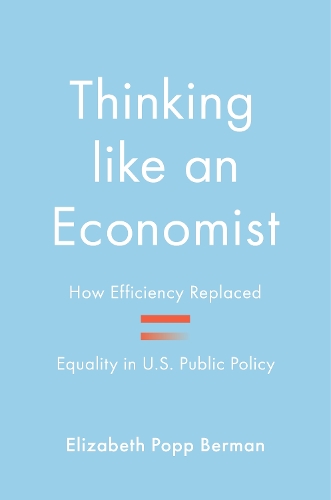
Thinking like an Economist: How Efficiency Replaced Equality in U.S. Public Policy
(Hardback)
Available Formats
Publishing Details
Thinking like an Economist: How Efficiency Replaced Equality in U.S. Public Policy
By (Author) Elizabeth Popp Berman
Princeton University Press
Princeton University Press
5th April 2022
United States
Classifications
Tertiary Education
Non Fiction
Business and Management
Economics
Central / national / federal government policies
330.973
Physical Properties
Hardback
344
Width 155mm, Height 235mm
Description
The story of how economic reasoning came to dominate Washington between the 1960s and 1980sand why it continues to constrain progressive ambitions today.
For decades, Democratic politicians have frustrated progressives by tinkering around the margins of policy while shying away from truly ambitious change. What happened to bold political vision on the left, and what shrunk the very horizons of possibility In Thinking like an Economist, Elizabeth Popp Berman tells the story of how a distinctive way of thinkingan economic style of reasoningbecame dominant in Washington between the 1960s and the 1980s and how it continues to dramatically narrow debates over public policy today.
Introduced by liberal technocrats who hoped to improve government, this way of thinking was grounded in economics but also transformed law and policy. At its core was an economic understanding of efficiency, and its advocates often found themselves allied with Republicans and in conflict with liberal Democrats who argued for rights, equality, and limits on corporate power. By the Carter administration, economic reasoning had spread throughout government policy and laws affecting poverty, healthcare, antitrust, transportation, and the environment. Fearing waste and overspending, liberals reined in their ambitions for decades to come, even as Reagan and his Republican successors argued for economic efficiency only when it helped their own goals.
A compelling account that illuminates what brought American politics to its current state, Thinking like an Economist also offers critical lessons for the future. With the political left resurgent today, Democrats seem poised to break with the pastbut doing so will require abandoning the shibboleth of economic efficiency and successfully advocating new ways of thinking about policy.
Reviews
"A Choice Outstanding Academic Title of the Year"
"Indispensable. Deeply researched and powerfully argued, it is easily one of the most important studies of American governance in many years."---Simon Torracinta, Boston Review
"Berman is well worth reading for deeply researched detail on how market-fundamentalist economics colonized the administrative state and thus weakened progressivism."---Robert Kuttner, American Prospect
"The historical account in Thinking like an Economist, which makes up the bulk of the book, is an original, insightful, and persuasive story. . . . Berman provides a fresh perspective emphasizing a wide variety of microeconomic topics, including antitrust law, antipoverty policy, health care, and the environment."---Jason Furman, Foreign Affairs
"Berman is at her best as an archeologist of ideas, digging through archives to excavate the origins of the economic style of reasoning and its takeover of federal policymaking."---Idrees Kahloon, The New Yorker
"As a non-economist who writes about economics, I felt seen by Berman."---Peter Coy, New York Times
"
The import of her book is clear to me. Its OK to believe theres value beyond markets and competition, and while efficiency can be a useful goal in many cases, sometimes we should embrace deeper values around fairness, and dare I say it, right and wrong.
"---John Warner, Chicago Tribune"This outstanding work is highly recommended. . . . Essential." * Choice *
"It turns out this kind of thinkingwhat Berman calls the economic style of reasoning'has taken over not just environmental policy but the entire US policy bureaucracy, to dismal results. Its as much something Democrats have done to themselves as anything forced by the right. One always enjoys having ones priors validated by scholars of much greater distinction than oneself, so I was delighted to read the book."---David Roberts, Volts
Author Bio
Elizabeth Popp Berman is Director and Richard H. Price Professor of Organizational Studies at the University of Michigan and the author of Creating the Market University: How Academic Science Became an Economic Engine (Princeton).
